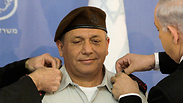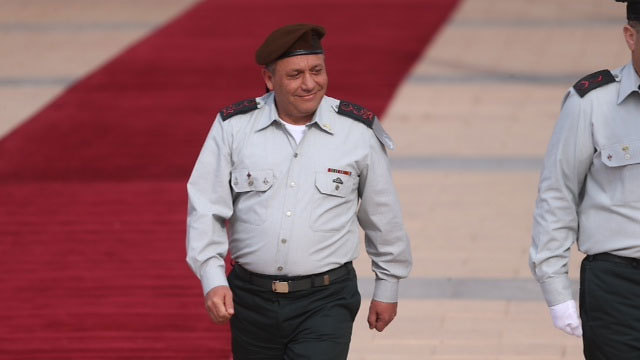
Gadi Eisenkot. Like former chiefs of staff, he is in for a trauma
Photo: AP
On Monday, during the IDF changing of the guard ceremony,
a former Golani Brigade fighter sent me a warning note to outgoing Chief of Staff Benny Gantz.
According to past experience, he wrote, when Golanchiks replace paratroopers it usually ends in a fight and in equipment stealing. So Gantz should quickly dispose of his equipment. A tip from graduates of the Paratroopers Brigade's 202nd Battalion.
This has been happening to everyone since the days of Shaul Mofaz. Quiet and noisy, a blue or red beret. Moshe Ya'alon left after the Ariel Sharon trauma, Dan Halutz had the Second Lebanon War thrown on his shoulders, Gabi Ashkenazi engaged in a war against Ehud Barak, and Gantz had politicians who made sure to brief journalists against his performance during Operation Protective Edge.

In reality, Gantz completed a four-year term without fighting with Golanchiks inside the army, but with quite a few blows from the combat politicians above him.
Changing of the Guard
Analysis: The new IDF chief of staff will have to face a potential massive conflagration on the northern border, but he has the tools to deal with whatever is thrown at him.
Sixty-seven years after the State of Israel's establishment, the chief of staff's job is to fight on two fronts, the Arab front and the Jewish front. Surrounded by terror and Arab armies, and the politicians in Jerusalem. No one can avoid the Jewish front, no one finds shelter under the burning fire.
Gantz's uniqueness is in his calmness and a healthy dosage of ego. Without these two things, Protective Edge would have likely ended in a war of declarations like Operation Cast Lead ended.

If it depends on some of our politicians, the military echelon – and mainly its leader – will have to take responsibility after the next war (Photo: Motti Kimchi)
This is based on the insight that Israel's next wars are going to look exactly like the wars we have been through: Terror organizations with the rocket ability of a regular army, using a civil population as a human shield, international pressure, lack of legitimization and legal consequences of any decision made by a junior commander.
In these wars there are only two options: Victory or consciousness. The first option requires the entry of military forces for a long period of time, international support, a Clausewitz destruction of the enemy's center of gravity, public patience and mainly predecision. We did it in the past.
The second option is based on a short and painful blow. Burning the enemy's consciousness. When such wars are waged, cannons fire, tanks maneuver and planes bomb in order to shape the consciousness.
The problem with consciousness is that it cannot be controlled. It's inside people's minds. People here and people on the other side. In the Al-Aqsa Intifada, Israel decided to defeat terror. In Gaza, since the disengagement, Israel has been trying – unsuccessfully – to shape a consciousness. The decision which type of war to launch is made by the political echelon.
The new chief of staff, Gadi Eisenkot, is in for a similar trauma. Despite the results of Operation Protective Edge and the cabinet ministers' bragging – there are still no decisions on how to with Hamas. There are no discussions between the videos. There is no initiative for regional development or decisions to destroy Hamas.
In this reality, someone will have to take responsibility after the next war, and if it depends on some of our politicians, it will be the military echelon again – or, to be more exact, its leader.
And this is where the problematic criticism about Minister Naftali Bennett's meetings with soldiers and commanders during Protective Edge comes in. If I were the new chief of staff, I would encourage the cabinet members to visit the forces now in order to study the reality, get to know the problems, discuss the solutions. The spirit of prophecy will not come upon them the moment the next war breaks out.
If I were the new chief of staff, I would ask the chairman of the Knesset's Foreign Affairs and Defense Committee to publish the open part of the report on Operation Protective Edge now, so that the public will be aware of what needs improvement, what requires a budget and what was stopped by the government, with all due respect to the elections.
Politicians only like to brag about successes. They are always the good economy/finance ministers while the others were the bad ministers. They are the defense ministers for successful operations, not for bad wars. They are the housing ministers for buildings that are being build, not for the cost of housing.
We can forget about order, discipline and credibility in the cabinet. A mentality of a supporting force. On this front, Eisenkot will only be able to win if he maneuvers them to discuss and make decisions now, so that later on they won't say they didn’t know. After the next war, the fire will be directed at him.
















